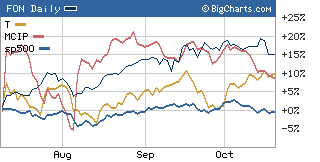
NEW YORK (CNN/Money) -
For the past few years, investors have been hoping (praying, even) for some much-needed consolidation in the telecom sector.
In fact, shares of MCI, fresh out of bankruptcy, are up nearly 15 percent since they began trading on the Nasdaq in July, thanks largely to takeover speculation. AT&T is up about 10 percent during the same time frame.
And now that AT&T has reported a $7.1 billion third-quarter loss due to a write-down in the value of its long-distance network, rumors are likely to escalate even further.
Many telecom observers think that long-distance companies AT&T and MCI (and to a lesser extent, Sprint) should get bought out because there is too much competition.
But investors shouldn't get too excited.
For example, even though AT&T has been aggressively cutting costs through layoffs and is paring down its debt load, Todd Rosenbluth, an equity analyst with Standard & Poor's, thinks that Ma Bell's management is taking these actions to try to save the company, not to make it more attractive for an acquirer.
"AT&T's job cuts and write-down of its network are an effort to go-it alone and generate as much cash to support its dividend," said Rosenbluth. "I don't think AT&T is primping for the prom."
Why buy?
In addition, neither AT&T nor MCI are what could be considered exciting growth opportunities for a buyer.
 |
|
| AT&T, MCI and Sprint have outperformed the market lately, partly due to takeover speculation. But will there be any takers? |
AT&T reported on Thursday that sales in its corporate division dropped 10 percent from last year's third quarter while revenues from its consumer division slipped 15 percent. MCI's second quarter sales fell 15 percent from a year ago.
"Why buy a business that's been declining 10 to 15 percent?" said Patrick Brogan, assistant director of research for Precursor, an independent research firm that focuses on telecom and tech.
Sure, both companies have a high-profile list of corporate customers that could be considered attractive to the Baby Bells -- Verizon, SBC Communications or BellSouth.
But Brogan said that the price tags are too high.
| Recently in Tech Biz
|

|
|
|
AT&T's market value is approximately $12.5 billion and it has about $6.3 billion in net debt (debt minus cash) that a buyer would have to absorb while MCI's market cap is about $5 billion and it has net debt of around $550 million. And the more the market bets on a takeover, the more expensive these stocks look.
"As long as investors keep bidding up the price of the long distance companies on speculation that there might be an acquisition, it actually makes an acquisition harder to complete," Brogan said.
Finally, Rosenbluth points out that the two most likely bidders are distracted. SBC and BellSouth, which co-own Cingular Wireless, will be busy over the next year with the integration of the Cingular's merger with AT&T Wireless.
And Brogan said that the other top Bell, Verizon, appears to be more interested in bulking up its own wireless business. So a purchase of AT&T, which does not have its own wireless network, makes little sense strategically.
Sprint could make sense as a target for Verizon since Sprint's wireless network operates on the same code division multiple access (CDMA) technology as Verizon Wireless. But even that deal isn't very likely because Brogan thinks Verizon would rather use cash to purchase the minority stake in Verizon Wireless that is owned by British telecom Vodafone.
So if you're only buying shares of AT&T, MCI or Sprint on the hopes that they will soon be acquired, that's not a wise move. It's time to hang up on the shares of the long distance companies.
The final Tech Biz Baseball Bet update: Disgust? Despair? Denial? I'm not sure how to feel after the Yanks' historic collapse. Congrats to Eric Hellweg and all the other denizens of Red Sox Nation. The better team won. Eric should receive some tasty bagels (courtesy of H&H) in the mail tomorrow. And I will be munching on a heaping dish of crow instead of chowder. Sigh.
Analysts quoted in this story do not own shares of the companies mentioned and their firms have no investment banking ties with the companies.
Sign up to receive the Tech Investor column by e-mail.
Plus, see more tech commentary and get the latest tech news.

|

